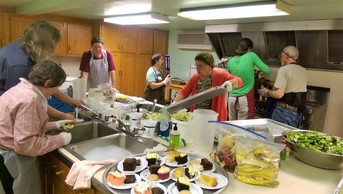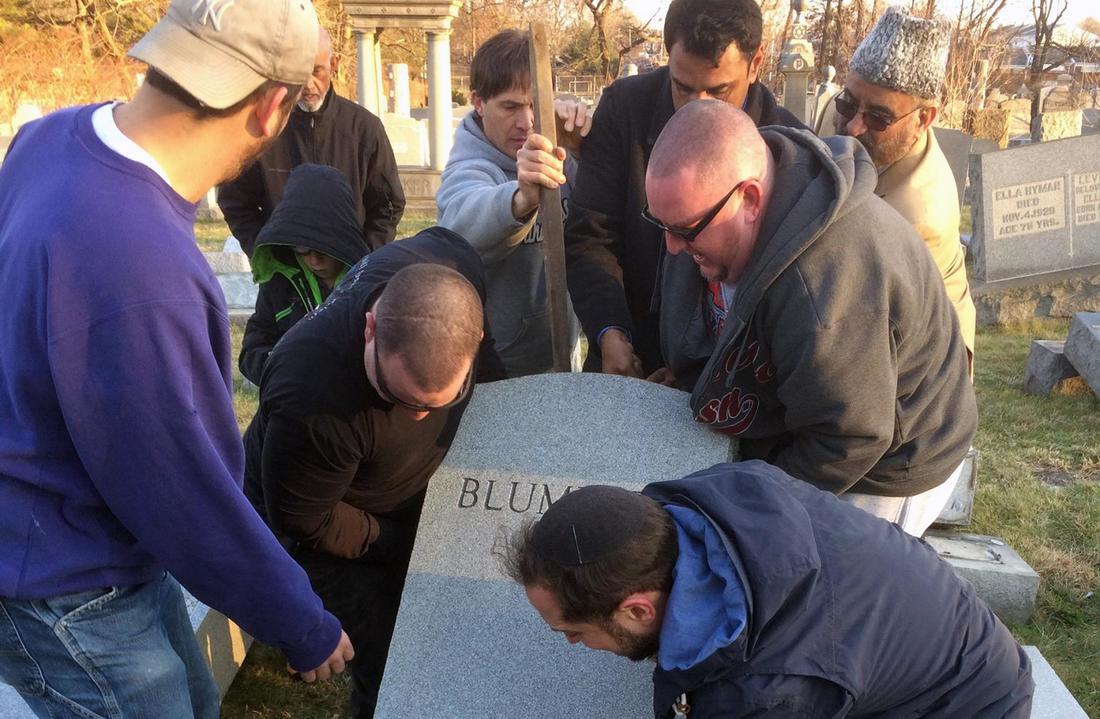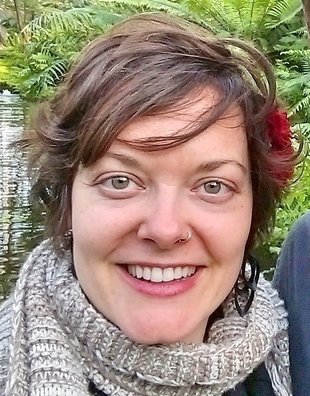|
Luke 24:13-35 They walk that dusty road for hours, seven miles to Emmaus. They speak of those turbulent political times. They don’t know which side he might be on, so they remark vaguely – “did you hear about that trouble in Jerusalem?” What small talk would you make with a stranger on a long walk? Or on an airplane? “See the color on that lily!” “Oh, watch the swallow dive!” “What a strange tree!” Even their small talk reminds them of Jesus. They arrive at the house, stomachs growling. “Come in” they tell the stranger, “the day is almost over.” They gather at the table. She brings the bread right from the fire, the smell of flame and hot stones clings to this bread. Their eyes follow that steaming bread, “rush this blessing” their empty stomachs grumble, and they watch him lift the bread – not their host, the head of this house – the stranger takes the bread. He says the blessing, bread above his head, with those familiar words. He breaks it and shares, one piece to the left, one piece to the right. And sometime between the stomach growl and the first taste on their tongues they know he is Jesus. Their friend, their teacher, their leader, their lost one. Why would Jesus, who loves them, who knows they are grieving and afraid, walk with them to Emmaus in secret, and then vanish as soon as they realize who he is? I have no idea. This mysterious story highlights Jesus’ provocative nature. We read of Jesus’ tenderness in stories like the healing of the man born blind. We read of Jesus’ fierceness in stories like the overturning of tables at the Temple. We read of Jesus’ provocative nature in stories like his interruption of the killing of the woman caught in adultery, or his mysterious statement about paying taxes. I don’t understand why Jesus’ friends don’t recognize him or why he disappears as soon as they do – but because the story unfolds this way we are directed to what Jesus does with bread. They know who Jesus is because they know what Jesus does with bread. And even though we’ve never watched Jesus handle bread, we have some idea how to recognize him, too.  Stone Church prepares the Community Soup Kitchen meal in April 2017 Stone Church prepares the Community Soup Kitchen meal in April 2017 Jesus takes, blesses, breaks, and shares in the feeding of the multitudes, at the Last Supper and here in this story. This is what to do with bread: take, bless, break, share. Jesus takes, blesses, breaks and shares bread in the feeding of the multitudes story. Remember? All those thousands of people gathered to hear him preach, all day they’re together and they’re getting hungry and they’re not in a town where they could find food, they’re out on the hillside with Jesus and the disciples, and Jesus decides they will feed each other, right there. So they disciples gather the people’s food and it’s not much, but they hand these few loaves of bread to Jesus and he takes, blesses, breaks and shares and there is more than enough for these thousands of people. That story is recorded six times throughout the gospels. We don’t know how many times the event happened, but six times we read what Jesus does with bread. And then at the Last Supper Jesus takes, blesses, breaks and shares bread; when Jesus gives us the practice of communion, it is by taking, blessing, breaking, sharing bread. And today we read that his own friends don’t recognize him until he takes, blesses, breaks and shares bread with them. I wonder if any of them could even describe just how it is that Jesus takes or blesses or breaks or shares bread that is so familiar. Maybe they could, but maybe their recognition is that rather unconscious knowing of muscle memory. We know things that we can’t explain. I could always tell who was coming up the stairs in my childhood home. If I really tried I could probably figure out how – I think my mom’s footsteps are the most deliberate. My sister’s are the quickest – or maybe that’s my dad’s? I can’t describe them to you, but if I was upstairs in that house this morning I would absolutely know who was coming up the stairs from the sound. I grew up in a laid back midwestern culture where everyone waits at four-way stop signs waving to each other. This is what we do in line in the rural Midwest. We wait, we wave. After I’d been living in Minneapolis for four years I was on my way to a church meeting and traveling with a Brethren friend, Nan, who lives in rural Ohio. We were at the gate waiting for our flight and when our zone number was called I joined the clump of people trying to figure out where the line was and how to get to the front of it. We were all subtly butting in front of each other when an opportunity arose. But then I noticed Nan. Not only was she waiting patiently for the line to sort itself out, she was kindly waving other people in front of her. And along with my embarrassment that I was joining an irrational mob (none of us would actually leave any sooner by pushing to the front). Along with my embarrassment about my unconscious mob behavior, I felt homesick for myself, the self I’d been only a few years ago when my muscle memory would have me hanging back, waving people by, and smiling with Nan. My muscles made new memories in those years. This is what to do in line. This is what to do with bread. Who will recognize you? What muscle memory expresses your identity to this world? We sing “They’ll know we are Christians by our love” and that’s a good start. Alexander Mack, who founded the Church of the Brethren in 1708, said people would know us “by the manner of our living.” Jesus’s friends know him by what he does with bread. By what in your loving, by what in your living, do people recognize you? This is what to do with bread: take, bless, break, share. I’d like to focus a whole sermon just on those four words because it’s not as simple as four words might imply. The gospel stories were oral tradition among communities that spoke Hebrew, Aramaic and Greek, eventually written in Greek, like the scriptures from Luke we’re reading today and some were probably written in Hebrew, like the book of Matthew. And then translated into Latin and then all the languages that people actually spoke, and those languages kept changing. So four words are never as simple as four words. But for today, we can let these four actions be as plain as possible. This is what Jesus does with bread: Take – he takes the bread and he gathers attention. Focus on this bread, this meal, this moment, this table. Here we are to receive and be fed. Bless – the traditional table prayer does not bless the bread, but thanks God for the blessing of bread, because all of the earth is God’s creation and all that bursts and blooms forth from the earth (the grains, the fruits, the creatures) are God’s, and this bread is God’s, so the blessing is to thank God. Break – whether it’s baked in a clay oven or on hot stones lining an open fire, the bread is baked for the table. Maybe you could eat a whole piece yourself, but you don’t. The first piece is broken and passed around and if you’re still hungry you’ll break off a piece of the next bread that comes your way. Share – now Jesus has bread in each hand – is he going to pass one and eat the other? Remember how the disciples argue sometimes about which of them is the greatest and who gets to sit in the place of honor at the table? A table tradition in their culture was that the head of the household would give thanks for the bread, break off a piece for himself (it would have been a him) and then pass the bread to the person on his right, the guest of honor, who would break a piece, and pass, and around the table the bread would go, from the most honored to the least honored. And Jesus disrupts that over and over. He tells the disciples to quit arguing about who is the greatest because the first shall be last and the last shall be first. He kneels and washes their feet at the table – he acts as both the head of the house who takes, blesses and breaks the bread, and he acts as the slave of the house who washes their feet. Jesus has two pieces of bread now, and we read “he gave the bread to them.” Them. In each of the six stories of feeding the multitudes, at the Last Supper, and here in Emmaus, scripture says each time that Jesus gives the bread to “them” and I believe he is sharing both pieces at once, one from his right hand and one from his left. Sharing bread this way means there can be no simple hierarchy of greatness. Sharing bread this way is in the manner of Jesus’ living, giving everything away like he asks us to, giving away even himself. And now the pattern can start again, because how did Jesus take the bread in the first place? Someone gave it to him, the woman of the house, a servant, someone baked that bread that Jesus gets to feed us with. We should be recognized by the manner of our living. We recognize Jesus because this is what he does with bread: take, bless, break, share. This is what to do with our burdens: take, bless, break, share. That’s why we voice our joys and concerns every Sunday, to offer each other the opportunity to love us, to hold us in prayer, to take a piece of our burden so we can all share the load together. We are known by the manner of our praying together. We are known by the manner of our eating together, especially when we have potlucks. Take your dish, bless the gathering, break bread and casseroles and brownies into servings and share the nourishment. A potluck is a faithful Brethren act. Sure, we could bring our own sandwich and eat what we like. But when we have a potluck we’re putting our faith in one another that we’ll have enough, and moreover that we’ll have a well-rounded meal only because each other has come to the table. Of course Christians, not even Brethren, have a corner on this “manner of our living” or “they’ll recognize us by our love.” In February, a group of people vandalized the Mount Carmel Cemetery in Philadelphia, shoving headstones to the ground that weigh hundreds of pounds. This is what we do with cruelty: take, bless, break, share. Muslim communities from Philadelphia and New York City came to the cemetery to help. This is what to do with cruelty: Go to the cemetery. Stare, stomach heavy. Shake your head. Bend low and lean your whole self into that stone. Move the heaviness from your stomach into your shoulder and push with all your sadness and shame and worry. After an arsonist burned the Islamic Society of New Tampa, Florida, Adeel Karim launched a fundraising campaign to help with repairs. “He noticed something unusual about donations … in multiples of $18: $36, $72, $90, and more, which initially confused him. ‘Then I figured [it] out after clicking on the names Avi, Cohen, Goldstein, Rubin, Fisher,’ Karim wrote on social media. ‘Jews donate in multiples of 18 as a form of what is called ‘Chai.’ It wishes the recipient a long life.’” (https://www.christiancentury.org/article/interfaith-support-rises-along-attacks) This is what to do with fear: give generously and wish others a long life. This is what to do with sorrow: reach across religious and cultural lines and take – take focus and attention to the sorrow and situation at hand. Bless – give thanks for what is good and find where God is at work. Break – break down the mess, the sorrow, the cruelty, the fear – break it down into bite size pieces. And share. Pass it around. Again. And again. May we be recognized by the manner of our living, amen
1 Comment
Mom
5/3/2017 07:28:04 pm
Take, Bless, Break, Share. Thanks for this!!! I like that for a mantra. Good stories, great message.
Reply
Leave a Reply. |
Archives
January 2022
|


 RSS Feed
RSS Feed